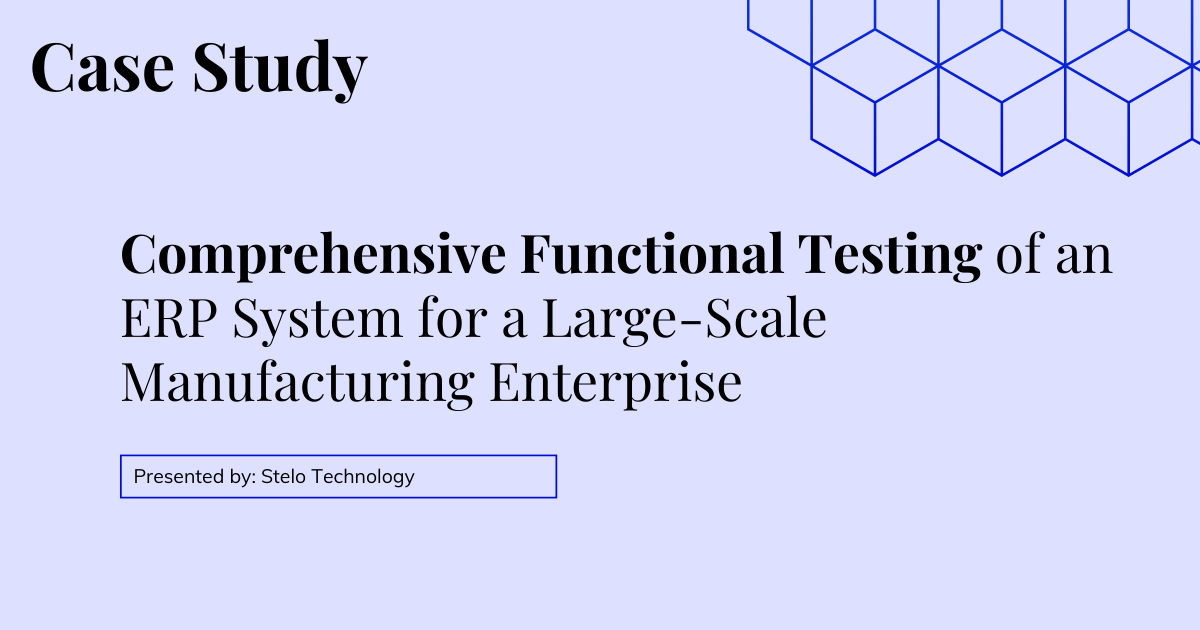Objective
The primary objective was to ensure that the ERP (Enterprise Resource Planning) system’s functionality met the specific business requirements and operated seamlessly across all departments of a large-scale enterprise for Functional Testing for Manufacturing. This testing aimed to support an uninterrupted flow of operations and improve overall business efficiency.
Scope for Functional Testing for Manufacturing

The Functional Testing for Manufacturing was exhaustive and encompassed all crucial modules of the ERP system, including:
- Inventory Management: Ensuring accurate stock levels, order fulfillment, and integration with other modules.
- Production Planning: Testing scheduling capabilities, resource allocation, and batch production processes.
- Sales and Distribution: Verifying order processing, invoicing, and revenue recognition functionalities.
- Finance and Accounting: Assessing the accuracy of financial reporting, compliance with standards, and integration with other financial operations.
- Human Resources: Testing HR management functionalities including payroll, recruitment, and employee data management.
Key Activities
- Requirement Analysis:
- Collaborated with department heads to gather comprehensive business requirements.
- Created a detailed requirements document that served as a blueprint for the testing phases.
- Test Case Design:
- Developed test cases that mapped directly to each business requirement.
- Prepared scenarios for various functional processes, ensuring coverage of all possible business operations within each module.
- Functional Testing:
- Conducted rigorous testing sessions to execute the designed test cases.
- Involved real-world simulations to test the ERP’s performance under typical business operations.
- Defect Tracking:
- Utilized a defect tracking tool to systematically record and track any issues found during testing.
- Prioritized defects based on their impact on business processes and worked closely with the development team for resolutions.
- Validation of Business Processes:
- Validated the corrected functionalities post-defect resolutions to ensure they met the required standards.
- Conducted final validation with end-users to ensure the system was user-friendly and met the business operational needs.
Ready to enhance your software quality and accelerate your time to market? Contact us today at sales@stelotechnology.com to request a customized quote for your business!
Challenges
- Complex Integration Needs:
- The ERP system needed to integrate seamlessly with multiple legacy systems which posed significant technical challenges.
- Solution: Implemented middleware and customized APIs to facilitate smooth data flow between systems.
- Data Migration Issues:
- Migrating historical data to the new ERP system was fraught with issues of data loss and corruption.
- Solution: Developed a robust data migration framework with strong validation checks to ensure data integrity.
- User Adaptation:
- Resistance from users in adapting to the new system due to complexity and change in workflow.
- Solution: Organized extensive training sessions and created detailed user manuals to ease the transition process.
Outcomes
- Improved System Reliability: The extensive testing ensured that the ERP system was robust and reliable, capable of handling large volumes of transactions without failure.
- Alignment with Business Processes: The ERP system was finely tuned to align perfectly with the business processes, ensuring that each department could leverage its functionalities to the fullest.
- Minimized Operational Disruptions: The careful planning and execution of the testing phase minimized disruptions during the ERP implementation, allowing for a smooth transition and continuity of operations.
Conclusion
The comprehensive functional testing of the ERP system for the large-scale manufacturing enterprise resulted in a highly reliable and efficient system tailored to the specific needs of the business.
The proactive approach in addressing challenges and engaging with end-users ensured the success and acceptance of the ERP implementation, driving significant improvements in operational efficiency and productivity.


